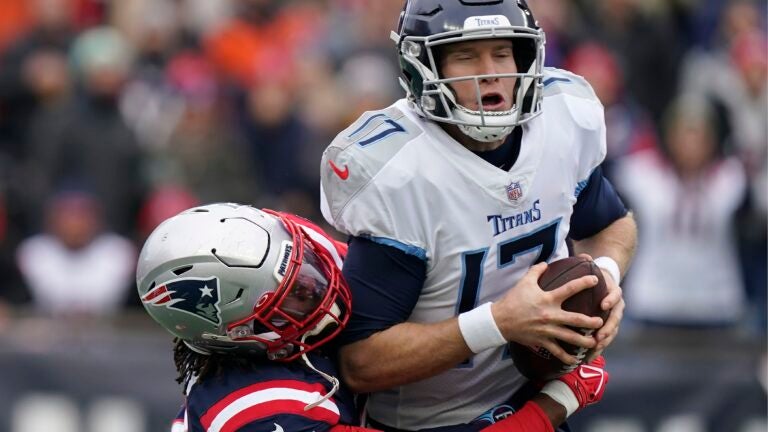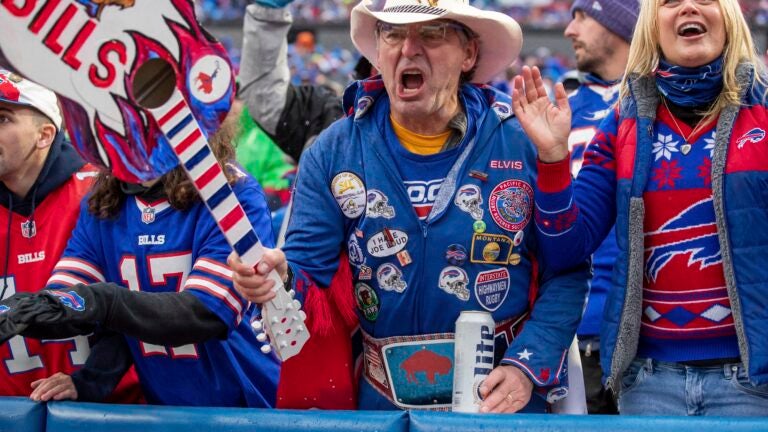Favorable timing and injury luck have factored into New England's 6-game winning streak, but how much should that matter?

COMMENTARY
Over the course of an unbeaten November, the Patriots pummeled their opponents by an aggregate score of 130-26. And if the raw numbers aren’t impressive enough, do the math: On average, the final score of their four games was 32.5-6.5. Their average margin of victory was 26 points. For the month, they scored five times as many points as their opponents. Five. Times.
As a wise man once said, “Ball don’t lie.”
Might it fib a little, though?
There’s no denying the Patriots have played their way back to the cusp of contention. They’ll enter December first in their division, and no team in the AFC has more wins than New England’s eight. They’ve put themselves in this spot on the strength of six straight victories, and in that span only the Chargers have managed to stay within three scores of them.
But, even after all that success, are we sure the Pats are really as good as the masses are making them out to be?
Sunday’s clash did little to answer that question, even in conquering a Titans team that began the afternoon as the AFC’s No. 1 seed. Tennessee was missing its most valuable player, Derrick Henry, plus its two best offensive weapons beyond him and a couple of defensive starters. Mike Vrabel’s roster looked better equipped for a preseason game than it did a post-Thanksgiving tussle over the top of the conference.
The 36-13 final suggests a result reflective of that reality — although the score is deceiving. Into the middle of the third quarter New England’s lead was only 19-13, and Tennessee had two possessions with a chance to take the lead. One brought the ball into Patriots territory before it was fumbled away at the end of a 30-yard run.
The trajectory of the game could’ve been different had the Titans held on to the ball there. Or had they converted on first and goal from the 5 on their next series. Or had linebacker Jayon Brown held on to an interception that could’ve easily become a pick-six in the second quarter. Or had Randy Bullock not clanged two early kicks off the uprights.
As it were, the Patriots didn’t extend their lead beyond the reach of two scores until the Titans were desperate enough to attempt a fourth and 14 from their own 21 with less than six minutes to go. Conceivably, had just a play or two gone differently for Tennessee to that point, New England could’ve easily found itself in a dogfight.
Given the circumstances, it’s hard to look at Sunday’s game and say that the Patriots would be clear favorites if these teams were to meet again in January, with the Titans even slightly healthier and less COVID-hampered.
And that’s the problem with putting too much trust in the results of this past month, throughout which the path of least resistance has availed itself to the Patriots on a regular basis.
When they played the Panthers, star running back Christian McCaffrey was just returning from an injury that had cost him the previous five weeks. Stephon Gilmore was still getting up to speed with his new team, and playing limited snaps. And — perhaps most unfortunately for Carolina — Sam Darnold had returned from injury just in time to get back behind center against Bill Belichick’s defense.
A week later, when it was time to face the Browns, Cleveland’s franchise back, Nick Chubb, came down with COVID-19. Days after trading Odell Beckham Jr., that illness limited what the Browns could do around Baker Mayfield, who was himself listed on the injury report with three separate ailments.
Next they went to Atlanta — where Cordarelle Patterson was inactive because of an injury, and Calvin Ridley was away from the team as he attends to his mental wellbeing. That combination cost the Falcons their biggest weapon for this season and their most dangerous playmaker in general.
And then came the skeleton crew of Vrabel and Co.
Is there a signature win in that mix? Is there a victory that could truly be considered to be over another AFC contender — or even another playoff team? Given the condition of the Titans, the closest thing might be the Halloween triumph over the Chargers, who, at 6-5, are the only team the Patriots have beaten that is currently better than .500 for the season.
Just three other AFC teams have scoring differentials better than plus-50 for the season, and the Pats will play three games against those clubs in December, so New England’s legitimacy will be better tested over the coming month than it was the last. If it stumbles in two of those three against the Bills and Colts, the narrative come New Year’s Eve is likely to be far different than the talk of today.
But, then, there’s another side to the question of whether the Patriots are indeed this good.
Does it even matter?
If the past month has proven anything on a league-wide scale, it’s that nothing is reliable. There are no sure things, with injuries and inconsistency wreaking havoc on the landscape anytime it appears as though a measure of certainty may be developing.
Maybe the Patriots don’t really have to be that good — because nobody is that good. Not the Chiefs. Not the Bills. Not the Titans, especially not when they’re beat up. And not the Ravens, either. Baltimore survived Lamar Jackson’s four interceptions on Sunday, but the top seed appears to be getting by mostly on guile.
By the time the postseason comes, momentum and confidence aren’t likely to count for much, and November will mean nothing. Records and seeding might not matter either, because with the degree of imperfection and parity permeating across the NFL, in a single-game playoff there appears a pretty decent chance fates won’t be determined by which roster is more talented or which team is better. It’ll simply come down to which side is healthier and makes fewer mistakes on that given day.
That recipe worked quite well for the Patriots this past Sunday. It has for a while now, too — yet the question remains: Are they really good enough to make this success sustainable?
Or maybe we’re just lying to ourselves about what this team truly is.
Sign up for Patriots updates🏈
Get breaking news and analysis delivered to your inbox during football season.
"really" - Google News
November 30, 2021 at 09:03PM
https://ift.tt/3I9coIc
Are the Patriots really this good? - Boston.com
"really" - Google News
https://ift.tt/3b3YJ3H
https://ift.tt/35qAk7d
Bagikan Berita Ini















0 Response to "Are the Patriots really this good? - Boston.com"
Post a Comment